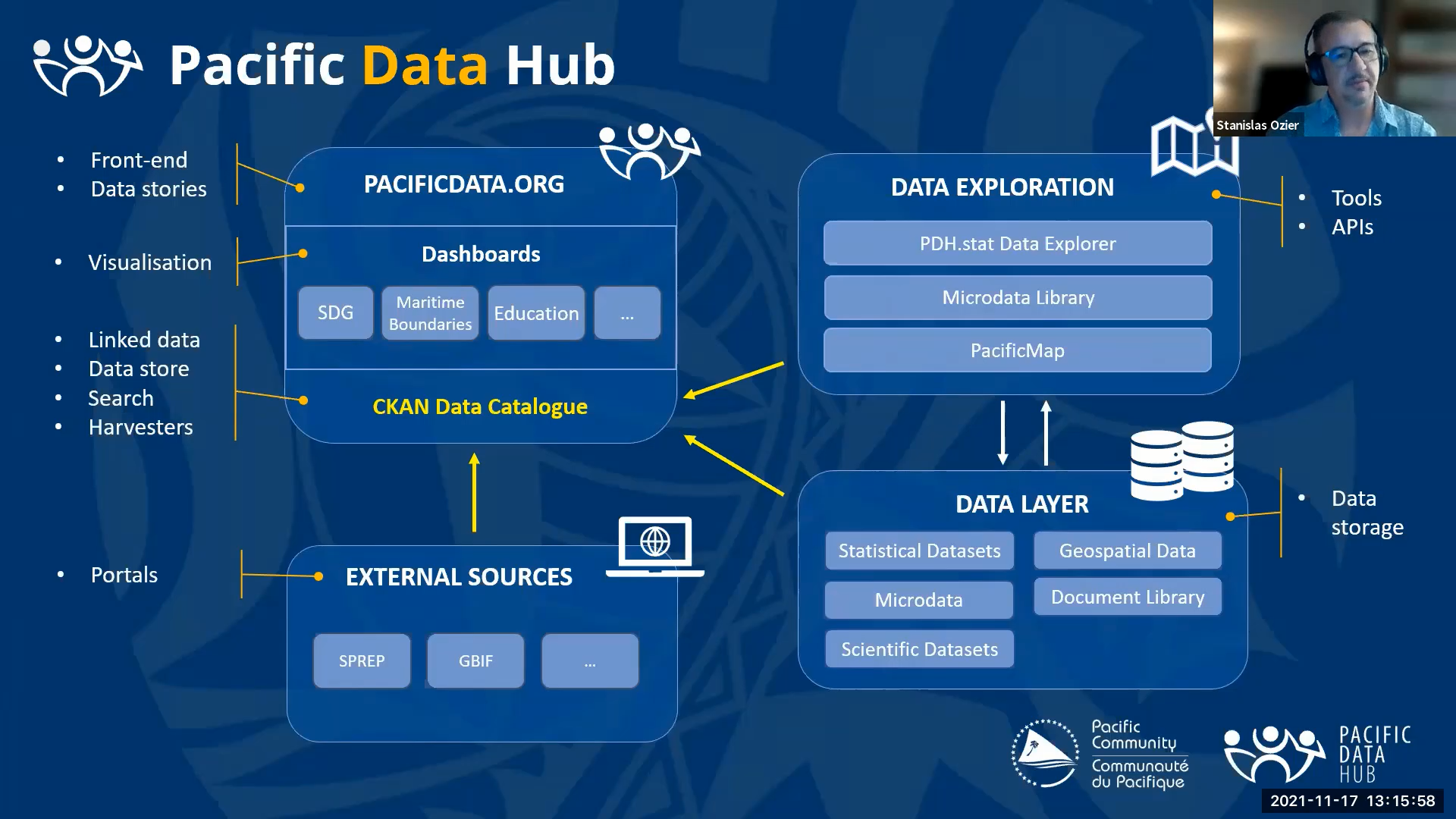"Don’t Overcomplicate It" – An Interview with NRC’s Nadine Levin on Building a CKAN Data Catalog That Works
From fragmented spreadsheets to actionable insights—how NRC leverages CKAN’s open-source power for better decision-making in crisis response.
This month’s CKAN Monthly Live highlighted The Pacific Data Hub - a central repository of data about the Pacific and from the Pacific. The platform serves as a gateway to the largest and most diverse collection of data and information about the Pacific across key areas including population statistics, fisheries, geoscience, agriculture, aquaculture, energy, education, human rights, climate change and oceans. The Pacific Data Hub is set up in a way that it allows Pacific countries to own and access the data as their own. Any government, donor, academic, or member of the community can both store, and access, good quality and reliable data.
We had a presentation from The Pacific Community (SPC) who talked about some of the good practices when building the Pacific Data Hub on a modern platform to help streamline data delivery to the public and showed us an overview of some datasets and a demo of how it all works in real. Sioeli Tonga and his colleagues Phil Bright and Stanislas Ozier shared some interesting insights about their data journey with CKAN and their experience in trying to establish a sustainable data infrastructure. For them CKAN was a proven data management platform with an active development community and a pool of development agencies who are ready and willing to help them get the ball rolling.
The Pacific Community (SPC) has gathered 70 years of data. That’s a lot of data! It’s been stored in different platforms, databases, systems or tools like Indicator Database, Microdata Library, etc. The problem was that the SPC was not the only one holding data in the Pacific - there were also other organizations having their own platforms and systems. So the main idea behind the Pacific Data Hub was to provide an entry point to all this data. What was the best way to gather all this data together? Of course, CKAN. CKAN was the best way to collect all the data they already had through harvesters, provide a Data store for new data that was coming in and provide a Search. On top of that they developed some dashboards based on specific topics such as SDG, maritime boundaries, education, etc. that can get the data from CKAN or sometimes directly from the other systems:

The Pacific Data Hub has five components, specially designed for functionality and ease of navigation:
Some other interesting topics the SPC touched upon were connected with the main challenges the team had to face:
Beyond the technology challenges, engagement with stakeholders, establishing and maintaining trust, and giving them confidence in what they were doing has been a real challenge for the SPC .
The SPC are continuously improving the Pacific Data Hub adding new features and usability improvements such as DOI and citations, trying to improve visioning and user documentation especially for publishers.
About the project
The Pacific Data Hub is a result of almost two years of working round the clock to create the central repository of open data and knowledge products about the Pacific region. After a successful testing phase, on 1 December 2020 the full production phase was launched. PDH is developed as a CKAN+Drupal installation that seamlessly combines both platforms into a best-of-both-worlds CMS plus open data platform solution. It is hosted on an AWS infrastructure and optimised for CKAN+Drupal deployments. This foundation supports custom UI and data visualisations to provide an open data portal that is both beautiful and highly functional to the public.
About the Pacific Community
The Pacific Data Hub is an innovative programme of work, led by the Pacific Community-SPC and supported by the New Zealand Ministry of Foreign Affairs & Trade. The Pacific Community (SPC) has been a custodian of Pacific data for decades and has been charged with a critical role in the compilation, updating and dissemination of the Pacific Sustainable Development indicator to assist countries in meeting the Sustainable Development Goals reporting requirements. The PDH is part of an emerging Pacific Data Ecosystem, a partnership between Pacific Island Countries and Territories, SPC and the Secretariat of the Pacific Regional Environment Programme to promote greater coordination in data management, dissemination and uptake initiatives. All members and development partners work together to strengthen data management capabilities, develop capacity and improve data literacy within the Pacific region, ensuring that all data resources are well-managed, shared responsibly and used ethically.
Speakers
On a final note, here is the recording of the full meetup: CKAN Monthly Live #5
We are not going to have a meetup in December due to Christmas and holidays. Our next meeting will be on 19 January 2022! You can sign up here to be notified for future meetups. We’ll announce the topic very soon! We look forward to seeing you all on CKAN Monthly Live!
Don’t forget to share your experience by using #CKANMonthlyLive
Follow us on Twitter, LinkedIn, and YouTube. You can join us on Gitter to say hi or ask any questions. See you there!
From fragmented spreadsheets to actionable insights—how NRC leverages CKAN’s open-source power for better decision-making in crisis response.
Discover how the Norwegian Refugee Council (NRC) is using CKAN to streamline humanitarian data management, improve collaboration, and enhance data accessibility for field teams across 40+ countries.